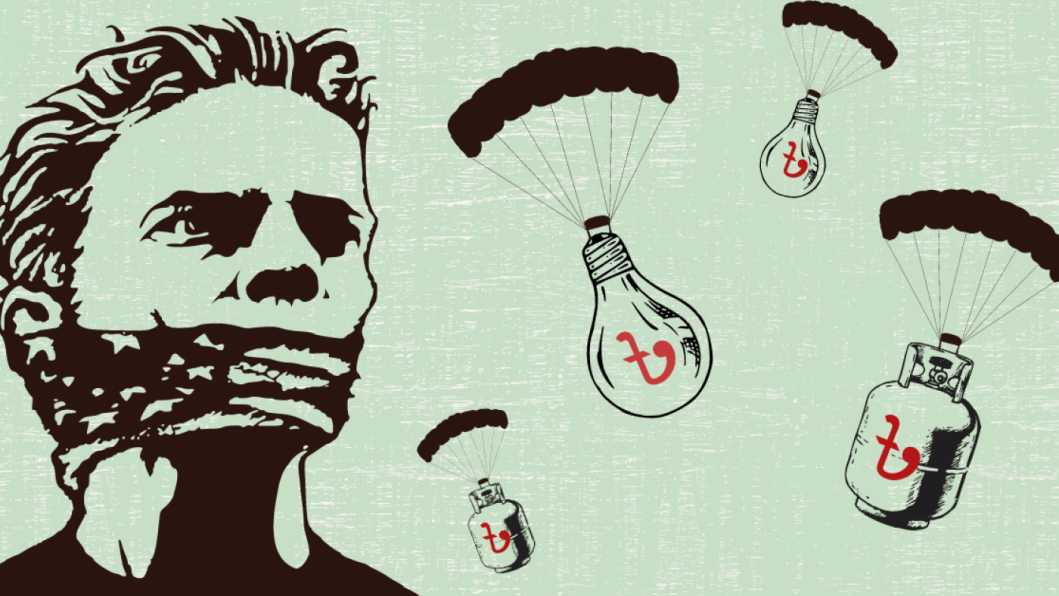How the energy sector shut its doors to the public

Earlier this month, the five percent electricity price hike and 78.2 percent gas price hike by the Energy and Mineral Resource Division raised concerns about the accountability of the government, and consumer rights. The December 2022 amendment of the Bangladesh Energy Regulatory Commission (Berc) Act 2003 empowered the government to set power and energy tariffs on its own under "special circumstances," without a public hearing by the Berc. Before the amendment, any price hike proposals used to be considered by the Berc after a public hearing, during which residential consumers, businesspeople, bureaucrats, civil society members and rights-based organisations could express their opinions. Hence, there was at least a mechanism to invite public opinion. Now, the door has been closed to any discussion.
The amendment bill was placed in parliament on January 22 to be vetted, and will be passed in the next few days. The government is justifying the amendment by citing the present situation as an emergency period or special circumstance.
I would call this a textbook example of "regulatory capture." George Stigler first introduced this term in the 1970s. Stigler argued that governments do not create a monopoly in industries unintentionally. Rather, they deliberately protect the interests of producers who capture the regulatory agency, and use regulations to inhibit competition. The result of such monopolies – in the name of liberalisation and competition – is often a transfer of public resources to private producers through price hikes, and at the expense of exorbitantly high social costs.
When electricity liberalisation began in the 1990s, electricity regulatory bodies were created in many countries to protect public interest. Regulatory bodies were seen as safeguards against uncontrolled market price hikes as private electricity producers intended to maximise profit. Following the global neoliberal trend, Bangladesh also established the Berc in 2003.
In the past, Berc, bestowed with the regulatory power to act in the public's interest, set the tariff in ways that may have benefitted private power producers in different ways. But there was at least a mechanism of accountability, no matter how ineffective the role it played in protecting public interest. The recent decision of taking the power away from Berc and empowering the Energy and Mineral Resource Division to set prices reveals that the government does not feel the need to hear the public's voice anymore. Even if they claim they care about public opinion, this is a sham statement.
Before the gas price hike in the industrial and commercial sectors, the media was flooded with the information that businesspeople were ready for a price hike because of the desperate need for gas to continue production. It may seem that the government has actually heard their voices and decided to increase gas prices so that LNG can be imported with the additional revenue. In reality, we are still in limbo about understanding how the government will pay the dollar amounts for imported LNG. Dwindling forex reserves have already brought up so many examples of our inability to pay for imported energy that it is difficult to understand how it will be used to meet essential import demands.

Because of dwindling forex reserves, not only has the import of LNG become uncertain, but so has the import of coal for Rampal and Matarbari power plants. Unless potential avenues are opened up to ensure an inflow of foreign currency, how will the government pay? The absence of new dollar-earning sources worries us. If there had been a public hearing regarding the recent gas and electricity price hikes, this question could have been discussed in public. Concerned citizens could have asked about the government's plans.
The fact that the price of gas did not increase for residential users this time around gave off a false impression that the price hike would only affect businesses, and not residential users. The whole focus was put on the demands of industrialists, who have been endlessly suffering from a gas crisis. There is no doubt that their concerns need to be addressed. But how can we ignore the potential effects of the gas price hike on the power sector, which will ultimately impact the whole population?
Gas price hikes in the power sector will eventually put further upward pressure on electricity prices. Sooner or later, residential users will be affected. Besides, existing inflation will soar as a result of increased costs of production in industries. Eventually, all will be affected. But where and to whom do we pose this question?
Berc is no longer functional, although its functionality in the past was already questionable. Despite having the capacity, why was Bapex not given the responsibility to drill wells, and why was the Russian company Gazprom appointed to construct wells instead, at a cost three times higher than what Bapex had offered? Why were "gas funds" – created with revenue generated from previous price hikes and intended to be used for the development of local gas – loaned out to import LNG? Why did the government not utilise the gas funds to extract onshore and offshore gas?
For these answers, we used to wait for public hearings where activists, politicians, experts, and the Consumer Association of Bangladesh (CAB) could question the concerned authorities.
Now, with the excuse of a crisis, the government has decided to take decisions that are more non-transparent, more controversial, and less justifiable than ever before. Slamming the door on our queries is what the government has decided to do instead, with its December 2022 amendment to the Berc Act.
It is definitely telling that the phenomenon of "regulatory capture" has existed in the past in different forms when the process of power liberalisation started in Bangladesh in the 1990s. The independent power producers (IPPs) started to produce electricity at high costs, compared to publicly owned plants. Using the power crisis as its excuse, the government facilitated IPPs.
In the last three years, IPPs were paid nearly 60 percent of the capacity charges from the revenue earned from selling electricity. Similarly, when the Quick Enhancement of Electricity and Energy Supply (Special Provisions) Act 2010 (QEEES) was enacted, rental and quick rental power plants started operating by bypassing competitive bidding and selling electricity at exorbitantly high rates. Over the last 10 years, the capacity charges for private power plants has become so high that it exemplifies how private producers misused the QEEES Act to transfer public money in favour of private gains for rentals and quick rentals.
There is a sharp difference between past examples of regulatory capture (through the QEEES Act 2010 and Berc Act 2003) and the new form of regulatory capture (the December 2022 Berc Act 2003 amendment).
In previous instances of regulatory capture, preventing competition used to be justified with the excuse of crises and for "protecting the interest of the public". The present "special circumstance" rationale does not recognise the social costs of price adjustment at all. The new form of regulatory capture only ensures producers' interests by preventing public hearings.
How can the government ensure that a handful of people will take right decisions on behalf of thousands of inflation-affected people? How will we know what is happening behind closed doors?
Moshahida Sultana is associate professor at the Department of Accounting and Information Systems at Dhaka University. E-mail: [email protected]

 For all latest news, follow The Daily Star's Google News channel.
For all latest news, follow The Daily Star's Google News channel. 












Comments